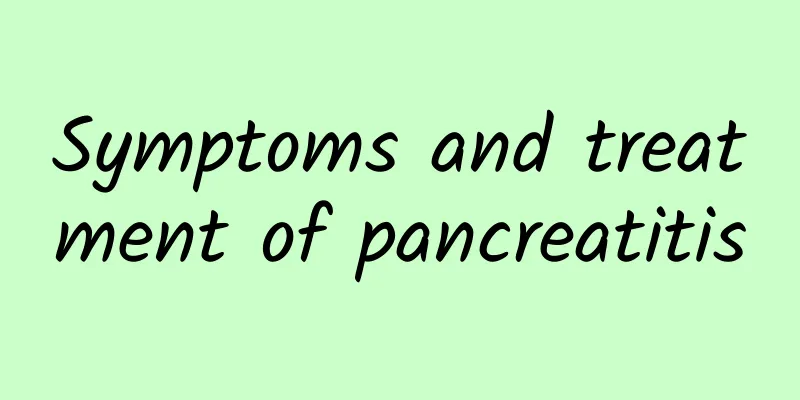Symptoms and treatment of pancreatitis

|
The pancreas is an important secretory organ of our body, which is composed of two parts: exocrine glands and endocrine glands. The exocrine glands mainly secrete amylase, lipase, etc. These enzymes play a certain role in the digestion of various substances such as fats and proteins. Moreover, the endocrine gland mainly secretes insulin, which plays an important role in regulating sugar metabolism in our body. Because the pancreas is an important secretory organ of our material metabolism, when it becomes diseased, it will have a certain impact on the metabolism of substances in our body. Pancreatitis is the most common disease of the pancreas. Pancreatitis can be divided into acute pancreatitis and chronic pancreatitis. Let us explain how we should treat pancreatitis when it occurs. 1. Acute pancreatitis 1. General treatment In the early stages of acute pancreatitis, mild pancreatitis and those without infection should be treated with non-surgical treatment. (1) Fasting and nasogastric tube decompression to maintain gastrointestinal decompression and prevent vomiting and aspiration. Giving whole-body motility drugs can reduce abdominal distension. (2) Replenish body fluids and prevent and treat shock. All patients should be given intravenous fluids, electrolytes, and calories to maintain circulatory stability and water-electrolyte balance. Prevent hypotension and improve microcirculation. (3) For those with a clear diagnosis of antispasmodics and analgesics, symptomatic analgesics can be given in the early stages of the disease. (4) Inhibit pancreatic exocrine secretion and pancreatic enzymes (5) Nutritional support: Early fasting, mainly relying on total parenteral nutrition. When the abdominal pain, tenderness and intestinal obstruction symptoms are relieved, you can resume eating. (6) Antibiotics should be given early in the course of treatment. In the case of severe pancreatitis complicated by pancreatic or peripancreatic necrosis, intravenous administration of broad-spectrum antibiotics or selective intestinal administration of antibiotics can prevent bacterial infection caused by intestinal flora translocation. 2. Surgery Pancreatic abscess, pancreatic pseudocyst, and pancreatic necrosis with infection are serious life-threatening complications of acute pancreatitis. If the diagnosis is uncertain; there is secondary pancreatic infection; there is concurrent biliary disease; or clinical symptoms continue to worsen despite reasonable supportive treatment, surgical treatment should be performed. (ii) Chronic pancreatitis Chronic pancreatitis should be treated causally, such as treating gallbladder diseases and quitting alcohol; dietary therapy, eating small meals frequently, a high-protein, high-vitamin, low-fat diet; pancreatic enzyme supplementation; controlling diabetes; and nutritional support therapy. Pancreatic duct drainage and pancreatic surgery were performed when necessary. To sum up, we can see how we should treat pancreatitis when we suffer from it. Of course, pancreatitis is mostly caused by our lack of attention to our daily diet, so when we suffer from pancreatitis, we should pay extra attention to our diet to prevent the disease from becoming more and more serious. |
>>: Early symptoms of hepatitis B
Recommend
What does a CT scan of the chest check?
Chest CT examination is also a relatively common ...
What are the effects and functions of eucalyptus oil
In daily life, we don’t come into contact with eu...
How long does it take for a caesarean section wound to heal?
Cesarean section is a relatively common method of...
What causes dermatitis?
Dermatitis is a very common skin disease in life....
How to care for patients with adrenal tumors?
Adrenal tumors are a type of tumor that can gener...
White spots on the scalp
Some people will suddenly find white spots on the...
How to discharge lochia and blood clots after childbirth
Regardless of whether the mother chooses natural ...
Dandruff should take more vitamin B
Studies have shown that excessive dandruff is rel...
Are test strips accurate?
With the development of medical technology in my ...
The efficacy of drinking water soaked with rabbit silk
Cuscuta australis is a traditional Chinese medici...
What is the correct sleeping position for patients with lumbar disc herniation?
How should people with lumbar disc herniation sle...
Can a patient with hemolytic jaundice eat breast milk?
It is really pitiful to see babies suffering from...
What causes swollen feet during pregnancy? Find the right way to get rid of edema
Most pregnant mothers will find their feet swolle...
The efficacy and function of Epimedium
If we want to truly understand the efficacy and f...
Can Guipi Pills cure bad breath?
Guipi Pills are a relatively common Chinese paten...









